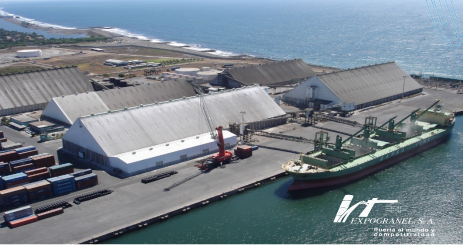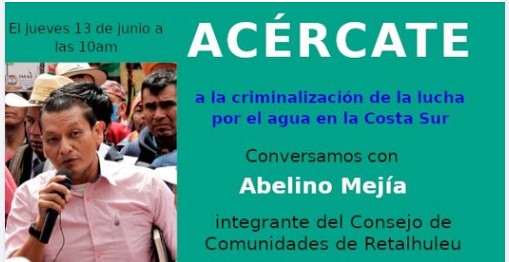Published by Brent Patterson on
On May 30, PBI-Guatemala posted on their Facebook page: “PBI accompanies the 4 people criminalized from the Council of Communities of Retalhuleu for defending the right to water. Today a sentence of complete acquittal was issued for the 4 defenders in the absence of elements that can first establish a crime and then the participation of all in a demonstration for the right to defend water.”

Just four weeks earlier, on May 2-4, PBI-Canada visited with the Council of Communities of Retalhuleu (CCR) on the South Coast of Guatemala.
While there, Abelino Mejia Cancino, one of the criminalized defenders, introduced us to communities experiencing water shortages related to the water-intensive sugar industry and showed us drained and polluted rivers, as well as water being taken from this river.


The CCR began to organize in 2015 because of the adverse effects of the expansion of sugar crops and sugar mills on water and the environment.
Canada is one of the largest importers of sugar from Guatemala. Since 2015, the time the CCR began to organize, Canada has imported 1.46 million tonnes of sugar from Guatemala. That sugar is shipped from Puerto Quetzal on the South Coast of Guatemala to the Lantic/Rogers refinery in Vancouver and the Redpath refinery in Toronto.
Photo: The Expogranel port in Puerto Quetzal.

Photo: Lantic/Rogers Vancouver Cane Refinery.

Photo: Redpath Sugar Refinery in Toronto.

The four members of the CCR have been criminalized since November 2019 due to their advocacy.
Panorama Noticias has reported: “Allegations of violations of the right to water, food and environmental pollution by the communities of the South Coast led to four defenders being criminalized by the mills of El Pilar and Magdalena. The Court of First Instance of Retalhuleu terminated a case in which they were accused, however, the case was appealed by sugar mills and the defenders were linked to the process.”
Photo: The entrance to the El Pilar sugar mill.

We welcome the news of the acquittal of Abelino and his CCR colleagues.
On March 13, 2022, a year before we met him in person, Abelino also participated in this PBI-Canada webinar.

Video of webinar.
At that time, he said: “There is a year-by-year certification process for the sugar mills. They need to visit not just the sugar mills, but the communities, that they come to see the rivers, they need to see the reality of the poverty the sugar cane industry is leaving here in our country.”
From the websites of Lantic/Rogers and Redpath, the companies that import Guatemalan sugar to the ports of Vancouver and Toronto, it appears that the companies conduct their own assessments/certification.
Redpath highlights: “’Sustainably Sourced’ and ‘Ethically Grown’ for Redpath means that our raw cane sugar comes from suppliers who: respect and work towards the highest environmental, social, and governance standards; uphold human rights; have been verified through our rigorous Ethical Sourcing Program.” They add their “Corporate Social Responsibility Program is an ongoing commitment to continuous assessment of our supply chain.”
And Lantic/Rogers also produced this ESG Report in June 2021 that says: “Rogers’ raw material sourcing is responsible.”

Abelino has also commented: “We need people to realize that when they consume sugar, it has an impact on the life of the communities and on the right to water for all. We call for the consumption of what is healthy and good produced by the campesinos and not products made by the big companies.”
PBI-Canada is currently in the early stages of planning an advocacy tour with Abelino and other members of the CCR to Vancouver and Toronto in 2024.
Stay tuned for more on this.
And for more (in Spanish), PBI-Guatemala will be interviewing Abelino this coming Tuesday June 13 at 10 am (in Guatemala) / 12 pm (Eastern Time).



